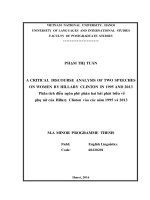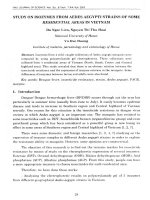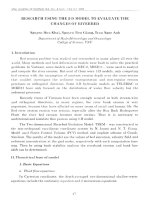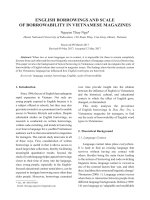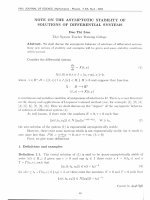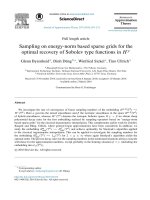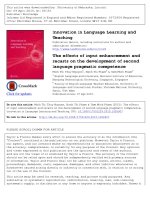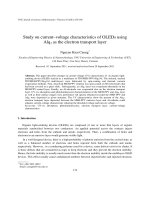DSpace at VNU: Limitation on the development of skills in higher education in Vietnam
Bạn đang xem bản rút gọn của tài liệu. Xem và tải ngay bản đầy đủ của tài liệu tại đây (123.85 KB, 14 trang )
High Educ (2013) 65:631–644
DOI 10.1007/s10734-012-9567-7
Limitation on the development of skills in higher
education in Vietnam
Thi Tuyet Tran
Published online: 20 February 2013
© Springer Science+Business Media B.V. 2013
Abstract This study investigates the perceptions of higher education students, recent
graduates and employers in Vietnam on the issue of skill development in the higher
education system in Vietnam. Enhancing skill development is considered essential for
students, not only to pursue their study, but also for their success later, at work and in life.
The results suggest that though there is evidence of effort to change, to include and to
develop soft skills in the system, the central-controlled curriculum, the traditional teaching
method, the prevalence of passiveness among students and cultural features all hinder the
effort of developing skills for university students. The limitation in skill development
during university is considered one of the biggest barriers preventing university graduates
from making a smooth transition to the workplace.
Keywords Skill development · Higher education · Vietnam · Limitations ·
Transition · Employment
Introduction
Since the economic liberalization in 1986, both the Vietnamese economy and its higher
education system (HES) have been developed very quickly. Paradoxically, despite the fact
that each year thousands of students graduate, many having difficulties finding work,
employers still complain that it is hard to find graduates with the required knowledge and
skills. Complaints are made about university graduates being weak in planning their future,
having impractical professional knowledge and lacking necessary skills required by the
contemporary workplace. Skill limitation is considered one of the biggest barriers
T. T. Tran (&)
La Trobe University, Melbourne, Australia
e-mail:
T. T. Tran
Vietnam National University, Hanoi, Vietnam
e-mail:
123
632
High Educ (2013) 65:631–644
preventing university graduates from having a smooth transition to the workplace (Tran
Ngoc Ca 2006; Tran Quang Trung and Swierczek 2009).
This paper discusses part of the findings of a doctoral research project entitled
‘Enhancing graduate employability: from the perspective of students and graduates in
Vietnam’. By looking at perceptions of university students and graduates and the expectations of employers regarding students’ skill development for the employment market, this
article is concerned with the wider context of the graduate skill development issue in
Vietnam. It aims to bring about the overall picture of skill development in higher education
in Vietnam, to examine the main reasons for the limitations for this development and to
suggest solutions to enhance necessary skills for Vietnamese graduates before entering the
workforce.
Literature review
From the end of twentieth century graduate career and employment patterns have changed
significantly. In an increasingly global competitive market, with the development of
information technology and the mobilization of workers across boundaries, organizations
and enterprises have undergone massive restructuring of downsizing, de-layering and outsourcing (The Association of Graduate Recruiters 2009). Perspectives on careers have also
changed accordingly. When many traditional jobs which were characterized by long-term,
stability and security offers and mutual trust have disappeared, the new career patterns are
more likely to be characterised by ‘flexible employment contracts, multi employers, lateral
job moves and multi career changes’ (Clarke 2008, p. 8). As a result, linear careers seem to
be replaced by more flexible, adaptive career patterns such as protean career (Hall and
Mirvis 2004), boundaryless career (Cheramie et al. 2007) and portfolio career (Fenwick
2006). The changes reflect the new characteristics of the labour market and also the desire
of many graduates, who now may prefer independence to employment security (Clarke and
Patrickson 2008).
Career management is no more managed by organisations, instead it has become ‘a
process through which an individual makes a contract with him/herself to make sense of
experiences, manage career choices and seek personal fullfillment’ (Hind 2005, p. 269). In
other words, each individual has to be in charge of their own career management and job
security which is anchored in their own ‘portable skills and employability’ (Mallon 1998,
p. 363).
In the international context, there has been increasing educational attention paid to these
portable skills. These skills are given various names such as transferable skills, soft skills,
core skills, key skills, generic skills, basic skills, cross-curricular skills, or more recently
employability skills1 (Bridges 1993; Hager and Holland 2006). Sometimes they are
referred to as ‘competencies’, ‘capacities’, or ‘abilities’ rather than skills. Debate on their
definition and how students best acquire them continues in many articles. However, in
general, the central aspiration of those who seek to identify these kinds of skills is
to find skills which can applied either or both: (i) across different cognitive domains
or subject areas; (ii) across a variety of social, and in particular employment, situations. The terms are used rather loosely, often interchangeable, and it would be
1
In Vietnam, ‘soft skills’ (ky˜ na˘ng me`ˆ m) is the term most often used to refer to a similar concept.
123
High Educ (2013) 65:631–644
633
somewhat arbitrary to draw distinctions in any very hard and very fast way (Bridges
1993, p. 45).
In other words, these terms are widely used to refer to a range of qualities and capacities that
are viewed as increasingly important in contemporary life. The main focus is usually on their
role in work and education viewed as a preparation for work (Hager and Holland 2006).
Higher education in Vietnam and the mission of preparing students for work
The idea of preparing students for work as the main mission of higher education in Vietnam
has long been established (Ta Thai Anh and Winter 2010). Up until recently, the main mission
of universities is still limited to produce an educated labour force for industry (Tran Ngoc Ca
2006). Higher education is considered to have the responsibility to provide students with
professional knowledge and skills and to help students satisfy the demands of the employment
market (Pham Thi Huyen 2008). The structure of higher education, thus, has also been
‘fundamentally designed to meet the needs of the labour market’ (George 2010, p. 34) with
small, mono-disciplinary higher education institutions (HEIs), each specialises in training
skilled workers to meet the projected labour requirements of each sector (George 2012).
Nonetheless the system was first built following the old Soviet system, and thus, it was
first designed to match with the needs of the central command economy (George 2010).
During the 1980s and early 1990s, some of the highly valued characteristics of workers
were often obedience, hard-working, loyal and able to follow orders (Nguyen Van Lich
˙
2009). The policy maker for both the HES and the internal economy in the central
economy was the central government. Most important decisions in the HES, such as
teaching curriculum, teacher salary or number of students each institution could take each
year, were made by the government. The industry’s operation was also not much different:
the government distributed products, decided on the price of products and was also the one
to pay the salary of workers. Salary was based on seniority, not based on merit or on
workers’ performance at work (Nguyen Minh Hien 2005; Nguyen Van Tai 2004).
However, things started to change since the implementation of the economic liberalization policy (known as Doi Moi) at the end of 1986, when the Vietnamese government
decided to adopt a market based economy. Instead of only state and co-operated sectors in
the central economy, the new industry has developed many new sectors, such as the private
sector, joint-venture and foreign direct investment enterprises (Nguyen Loc 2006; Pham
Lan Huong and Fry 2004). HES has also expanded rapidly. Instead of only state HEIs in
the past, new private HEIs and foreign universities have gradually been established.
Problems arose. The HES has been struggling to develop to meet the new needs of the
economy. Instead of requiring workers to follow order, to listen and obey, the new market
economy needs creative and initiative people, who can work independently under pressure
(Pham Thi Huyen 2008; Tran Quang Trung and Swierczek 2009). Vietnamese HES does
not seem to have been able to adapt to the change, especially when the whole system has
still been under the firm control of the central government and the central ministry—the
Ministry of Education and Training (Hayden 2005). The teaching in the HES has still
inherited many characteristics of the traditional teaching method which strongly reflects
both Confucian culture and the old Soviet top-down approach where the teacher is often
considered the primary source of knowledge (Tran Thi Tuyet 2013).
The gap between higher education and industry appeared and has expanded quickly. There
are more and more graduates who are unable to find jobs whereas employers still report their
123
634
High Educ (2013) 65:631–644
difficulties in finding skilled workers with required knowledge and skills. It is claimed that one
of the main reasons for the situation is that university students’ soft skills are weak or even
missing (Pham Thi Huyen 2008; Tran Quang Trung and Swierczek 2009). This contributes to
the ill-preparation of university graduates for the workplace, and increases the dissatisfaction
among employers when employing recent graduates (Tran Ngoc Ca 2006; Tran Thi Tuyet 2010).
Methodology
This study aims to investigate further the issue of skill development in higher education context
in Vietnam. In fact, there have been several research projects conducted on skill development in
HES in Vietnam. One common way of approaching the problem is importing a list of skills
from the international literature (See, for example Tran Quang Trung and Swierczek 2009;
Truong Quang Duoc 2006) and gathering the voices and perspectives (mainly via the form of
questionnaires) of research participants regarding the development of these skills in Vietnamese HEIs. The list of such skills as communication skills, problem solving skills or
teamwork skills seems to be important for everyone at work and in life, however, as Beckett and
Mulcahy (2006, p. 262) claimed, it cannot easily capture elements of knowledge which remains
specific and tacit. Or in other words, any list of skills will only make sense in its very specific
context and culture. Thus, it seems both simplistic and irrelevant when Vietnamese researchers
use a list of skills developed in a very different context (often in the West) and apply it to the
situation in Vietnam. What seems to be left aside or is unknown are the specific cultural norms
and values as well as the socio-cultural features in Vietnam.
This research is designed to ‘reduce ignorance’ (Gough 2002), to take into account the
hidden features of context and culture in Vietnam, to reveal the issue of skill development
in the Vietnamese context. Bearing in mind the aim of investigating the issue within the
very specific context of Vietnam, I have located my study within the constructivist paradigm. The constructivists argue that ‘realities are local, specific and constructed’
(O’Donoghue 2007, pp. 16–17). Creswell also adds that:
Constructivist researchers often address the processes of interaction aiming individuals. They also focus on the specific contexts in which people live and work, in
order to understand the historical and cultural settings of the participants (2009, p. 8).
Constructivism therefore promised to be of an appropriate ‘lens’ in my study particularly as I wanted to investigate the problem of graduate employability in the very specific
historical and cultural setting in Vietnam.
In order to investigate this issue with its complexity involving socio-cultural factors in
Vietnam, as well as what is involved in the skills debate, after carefully considering the relevant
literature, the framework developed by Hillage and Pollard (1998) was drawn upon for
designing this project. Hillage and Pollard consider skills as one of the employability assets,
and that the capability of each individual to successfully deploy skills and present these skills in
an accessible way in the market to find jobs and to maintain employment depends on their
perception of what skills the market requires from them and what skills they have to satisfy that
requirement. The ability to realise or actualise employability skills also depends on the context
(i.e. personal circumstance and external socio-economic and cultural factors) within which
graduates seek work (Hillage and Pollard 1998).
In terms of research participants, in the literature, there seems to be much focus on the
voice of employers and academics. However, what seems to be missing is the voice of the
young people. After careful consideration, it seemed to me that the current circumstance in
123
High Educ (2013) 65:631–644
635
HES in Vietnam as well as the relationship between it and the labour market, lacks this
perspective. I decided to consult final year university students and recent graduates to be
the main research participants.
The reason leading me to choose students and graduates as the main participants came
from the gap between higher education and the labour market in Vietnam. When there is
virtually no link between the higher education sector and the graduate labour market in the
country (The World Bank 2008; Trinh Thi Hoa Mai 2008), in order to succeed at work and
˙
in life, students and graduates become the ones, and the only ones who know and who have
to know and understand both sectors. I have become interested in researching the thinking
and experiences from the standpoint of Vietnamese tertiary students and graduates, who
are living, studying and seeking work in Vietnamese context. I have also become interested
in understanding the cultural factors affecting their perspectives, their directions and their
decisions in job seeking and their choices of work. Moreover, employment after graduation
is the topic of their current concern and interest. I was confident that they would offer
insight about this topic. This was the very reason I wanted to empower them, to hear their
voices and to learn from their perspectives and experiences.
When there is a ‘gap’ between the skills graduates acquire as a result of university
education and the skills employers desire (Pham Thi Huyen 2008), inviting the voice of
employers helps to bring about a clearer picture of how practical the students’ and graduates’ perception of skill development is. This helps to reveal the mismatch in the graduate
employment market.
Research questions
1. What do university students/graduates perceive about the skill development process in
Vietnamese universities?
2. What is the gap between students’ perceptions and employers’ expectations in terms of
skills university graduates acquire?
Research methods and research participants
This study is an exploratory study conducted via focus group interviews with university
students and in-depth interviews with recent graduates and employers. The study employed
three focus group interviews of 10 final year university students in each group. Group members
were selected randomly from different public universities in Hanoi (see details in table below):
Participating universities
Abbreviation of university name
Academy of finance
AF
Banking academy
BA
Diplomatic academy of Vietnam
DAV
Economic university—Vietnam national university, Hanoi
EU
Foreign trade university
FTU
Hanoi law university
HLU
Hanoi pedagogy university
HPU
Hanoi university of science and technology
HUST
123
636
High Educ (2013) 65:631–644
Table a continued
Participating universities
Abbreviation of university name
National economic university
NEU
The university of communications and transportation
UCT
The university of engineering and technology,
Vietnam national university, Hanoi
UET
The university of language and international studies,
Vietnam national university, Hanoi
ULIS
Individual, face to face, semi-structured interviews were conducted with 20 recent
graduates and six employers. There were several justifications for conducting individual
interviews with graduates and employers and focus group interviews with students. The
first was the practical one of graduates and employers being too busy with their work to
attend group events. The times and places that suited them were important and the research
had to fit in with their schedules. With students, however, it was less difficult to set a
suitable time for group discussions. The second reason was that graduates were more
mature and were anticipated to be more confident talking about their transition process
with just a researcher instead of a large group of people. They may be half way through this
process, or it may be too recent for them to comfortably discuss what it has involved. So,
conducting individual interviews would be more appropriate for these participants.
Student participants were younger, and they have not yet begun this transition to work,
so it was expected that they would be open in group discussions as the subject matter was
less personal and immediate.
A thematic approach to analysis
Thematic analysis (Creswell 2007) was employed for the analysing of interview data in this
study. In order to ease the inductive analysis (Patton 2002), Nvivo 9 with its strong data
analysis functions were used for data storing, organising and coding. The initial sorting stage
helped me to identify the emerging key points. However, these key points linked with their
quotations seemed to be huge to manage. In order to make the task manageable, I had to look
back at the framework of Hillage and Pollard (1998) and the research questions to identify the
common themes and corresponding sub-themes in the interview data. The themes and subthemes system made the task of sorting the data manageable. Key issues also emerged from
the analysing process. Important factors regarding skill development that were reported by
students, graduates and employers were also highlighted.
Study results
Students and graduates’ perception of soft skills
Participating students and graduates all seemed to share a similar view that soft skills are
very necessary and important in job searching, maintaining and satisfaction. Some of the
soft skills that most students and graduates considered important in the labour market were
team work, communication skills, independent working skills, presentation skills, social
understanding and decision making skills. According to the students and graduates, these
123
High Educ (2013) 65:631–644
637
skills were considered important because employers were looking for them. They suggested that enterprises needed high quality people who could do the job and who had both
good knowledge and skills in dealing with job requirements. Students and graduates also
stated that soft skills were becoming more and more important in employment market.
They could not seize many good job opportunities because they lacked soft skills. Some of
them even considered soft skills more important than professional knowledge:
Employers all understand that our knowledge is poor, after employing us, they will
have to train us from the beginning, but they always want to know what skills we
have, what we are good at and what we still need to develop (graduate—sale
manager).
Thus, many of them indicated that soft skills were important both at the point of
interviewing for the job and in job maintenance and satisfaction. At the point of seeking a
job and interviewing for the job, communication skills and sensitivity in communication
seemed to be the most important for them as these would help them ‘express ourselves’,
‘understand what employers look for’ and ‘respond properly’. Soft skills also helped them
find the job they wanted more easily. All graduates indicated that soft skills were truly
essential in carrying tasks at work and in helping them build confidence in the workplace.
These comments of the students and graduates show the similarity of the portable skills,
qualities and capacities that are viewed as increasingly important in employment market
(Hager and Holland 2006) in Vietnam and elsewhere in market driven economy. Such
skills as teamwork, communication and decision skills were also considered by Vietnamese students and graduates as important to help them enter the job market and maintain
their success at work.
However, some graduates, especially the ones who work in the Government sector did
indicate the differences between the soft skills they think they should develop and the ones
they often read from books or hear from rumours. For example, a graduate who worked for
the government post office joked:
In my company, we just need to follow our boss, don’t argue with him. Because if
you do, the next day you can stay at home and drink tea [it means you will get sack
the next day].
One student also suggested the distinctive features of soft skills needed in Vietnam:
I personally think that different societies are different, Vietnamese society is
‘messy’, Vietnamese culture is also different, we do need some other kinds of skills
and sensitivity.
The above comments were a very good example illustrating Beckett and Mulcahy’s (2006)
point of view that skills are context and culture dependent. In the case of the Vietnamese
workplace, the evidence of the central command economy could still be found in the
government sector. Students and graduates had initially recognized the differences between
skills required at work in Vietnam and elsewhere. However, they were not able to name
exactly what the differences were.
Skill development at university in Vietnam
When talking about skill development during university, most participants had a similar
view to Stephen et al. (2006) that university curriculum, in general, does not support soft
skill development for students, that there is a lack of focus on skills both in the curriculum
123
638
High Educ (2013) 65:631–644
and the teaching, learning and assessment at university. Thus, most of them were not
satisfied with the skills they had developed. They suggested that their skills were generally
weak and could not meet the demands of future work.
Interestingly, most students and graduates blamed their lack of proper soft skills on
their universities. They either said that ‘soft skill teaching is one of the shortages of
every university. Apart from knowledge, we cannot learn anything about soft skills’ or
‘we cannot get any instruction about soft skills, universities do not have any instruction,
teachers do not teach either’. Some of them stated naively ‘we do not have a soft skills
subject in our universities’, or ‘our universities should teach us soft skills, but they
don’t’. Some others suggested that there were not enough activities provided by their
universities to develop skills. Some also complained about the lack of guidance from the
university:
My university does not have activities to help students develop skills. We have to be
in charge of the career orientation for ourselves. The case that teachers get involved
in career orientation for students is very rare (Accountant graduate).
They even considered soft skills as being similar to knowledge where university teachers
should teach them in class, thus they heavily criticized their universities ‘my university
doesn’t equip me with any skill at all!’ and considered ‘that’s a shortcoming of Vietnamese
universities’. They also blamed it for the situation in Vietnamese universities, where
students normally focus on only the marks in their exams. Coming to the class just to ‘get
the necessary knowledge from the teacher’ to prepare for the exam, thus, many of them did
not seem to see the link between being actively involved in class activities and the
development of soft skills.
Sometimes teachers do give us group work or ask us questions in class. However, we
are often reluctant to join in or to answer. We don’t often devote much for these
activities because there’s no mark for them (student from NEU).
Students’ and graduates’ perceptions reflect a contrasting picture where they all seemed to
understand the importance of soft skills in career development and they could also name
important skills, however, they did not seem to be active in finding ways to enhance their
skills. Instead, they placed high expectations on their universities to help them or even to
equip them with those skills. They did not seem to understand that they should be the ones
who had to be ‘in charge of their own career management’ (Mallon 1998, p. 363), or in
other words, they need to make sense of experiences, manage their career choices and seek
personal fulfilment for themselves (Hind 2005, p. 269). They also confused skills with
knowledge and expected that skills should be explicitly taught in the curriculum. They did
not seem to capture the idea that they could develop skills by being actively involving in
activities across different domains or subject areas (Bridges 1993). The over focus on exam
results and academic achievements in Vietnam (Kelly 2000) may be one of the main
reasons creating students’ misunderstanding that only good marks were the indicator of a
good and successful student, and being active or passive in class activities or extracurricular activities did not really matter. This feature of Confucian Heritage Culture in
Vietnam (Tran Thi Tuyet 2013) did seem to hinder students’ effort to recognize and to
make the full use of university activities to enhance their skills.
Nonetheless, it was worth discussing the development of soft skills in different universities as there was evidence of differences in skill development among them. Though
the participating students and universities were selected randomly, the details discussion in
group interviews revealed some interesting findings. Among all participating students,
123
High Educ (2013) 65:631–644
639
students from ‘foreign related’ universities2 seemed to be more positive about the soft skill
development in their universities. A ULIS student suggested:
In my faculty, the teacher often creates different activities for us to develop presentation skills and team work skills. We can work together in small groups, we can
present our work in front of the class. We feel much more confident after all.
The participating students from these universities were quite proud of having many
chances to join different events and movements to develop soft skills. They all seemed to
be quite active in group interaction. A positive environment for skill development in these
universities was explained by a large number of teaching staff in these universities having
been trained overseas. These teachers are normally keen to encourage students to ‘take part
in many language activities’ to learn foreign language better (Phan Le Ha 2004).
However, the participants from these universities also recognized that not all students were
actively involved in those activities as they did not see the link between involving in these
activities and skill development. Moreover, they also had to experience ‘switching their
learning style’, as in some subjects they had many opportunities to develop their teamwork
and communication skills, in some others, the teaching method remained quite traditional
with the teacher talking most of the time and students taking notes most of the time.
Nonetheless, the study environment of the ‘foreign related’ universities made students from
other universities feel ‘jealous’. Students from ‘financial and business related’ universities such
as AF, BA, EU and NEU suggested that soft skills were very important for them to find jobs and
be successful in their occupation. However, they all claimed that the skill development environment in their universities was not good. A student from NEU felt regret that:
Our university equips us with lots of professional knowledge, but our soft skills are
very poorly developed. The teaching method in our university makes us become
lazier. We feel jealous of students from FTU because their teachers’ requirements are
tougher and they have a better environment to develop their soft skills. In our
university, teachers come to class, deliver the lesson, that’s it, they are not
demanding and give us high marks easily.
Nonetheless, soft skills development in ‘financial and business related’ universities was
considered better than in HUST, UCT and UET, the ‘science and technical related’
universities (Stephen et al. 2006). Students from ‘science and technical’ universities
complained that though they did have project work which required them to work in teams,
they still suggested that they had a very ‘dry’ environment for soft skills development.
There were too few extra-curricular activities for them to get involved in. Thus their soft
skills were worse compared to students studying in other disciplines. Students’ claims
seem to support the argument of Stephen et al. (2006) when they suggest that students in
this discipline often work with number, computers or machines. The typical study in these
universities does not require many interactions to negotiate the task. Thus their soft skills
are also hard to develop (Stephen et al. 2006).
Most students and graduates recognized that getting involved in the Youth Union or the
Student Association3 activities was a good way to develop their soft skills. However, some
2
‘foreign related’ universities refer to the universities using foreign languages as a medium of instruction,
i.e. ULIS, FTU and DV.
3
Each university in Vietnam normally has two departments in charge of creating students extracurricular
activities and movements, namely Ho Chi Minh Communist Youth Union (which is often called Youth
Union) and Vietnamese Student Association (which often called Student Association).
123
640
High Educ (2013) 65:631–644
of them ‘are not interested’ in these activities, some indicated that they wanted to get
involved, but ‘don’t know how’ or ‘don’t find interesting activities’. The common comment was that activities of the Youth Union and Students Association were both ‘too
much’ and ‘not enough’. What was considered too much was the singing and performance
related activities. However, there were too few activities related to other interests.
However, graduates also indicated that the lack of skill development in university
curriculum or the lack of/or not interested in extracurricular activities were only parts of
the problem which resulted in the poor soft skills and the lack of confidence at the point of
graduation. The situation was also rooted in Vietnamese culture, Vietnamese traditional
thinking and Vietnamese people’s traditional perception of education. One graduate
suggested:
Our traditional way of thinking is to emphasize theory, and look down on practice.
Parents, from the time we were at school, often do not like us to attend extracurricular activities.
Another added
Not only are extracurricular activities looked down upon, the chances for young
people to raise their own voice are also limited.
One graduate, who was a university lecturer, explained in more details:
Vietnamese education does not encourage children to think critically. Adults do not
like children to question; they want their children to be obedient. Since we were
little, we were educated that way. It is hard to change. Even in university, we know
for sure that something is wrong, but we don’t dare to speak up.
Obviously cultural features of looking down on extra-curricular activities, of the desire to
educate obedient children and students seemed to negatively affect the skill development in
university. The evidence of Confucianism still seems to be very strong in Vietnam. It not
only hinders students’ efforts to recognize and to make the full use of university activities
to enhance their skills, it also prevents students’ parents, who often have very important
role and voice in student’s study (Tran Thi Tuyet 2013), from recognizing the change
required in the society and in industry. They eventually become obstacles preventing
students from standing on their own feet, to decide their own matters and to ‘be in charge
of their own career management’ (Mallon 1998, p. 363).
Because of the lack of a supportive environment for skill development in universities,
and because skills were considered essential in obtaining job, many students and graduates
thought that they should attend skill classes.4 One graduate gave students advice:
You should attend soft skill classes, to learn more about soft skills, especially
communication skills. This is very important for provincial students, who do not
know how to communicate, who are often afraid of being clumsy, of not satisfying
other people or afraid that others won’t agree with you. When you attend those
classes, you will think more openly, you will become more confident and you will
find jobs easier.
4
Provided by some soft skills centres specialising in teaching soft skill courses such as: communication
skills, presentation skills, team work and interpersonal skills.
123
High Educ (2013) 65:631–644
641
Employers’ perspective
Though sharing the same opinion that soft skills were important in the contemporary
workplace, all participating employers did not seem to satisfy with recent graduates’ skills.
In general, employers agreed with students that university curriculum in Vietnam was
outdated and did not support students to acquire necessary skills contemporary market
required. However, they did not generally see that the responsibility for skill development
was only on the shoulder of universities, but that was mainly the responsibility of students.
In general, employers did not have positive comments on students’ soft skills. One
employer complained that ‘the life skills of all students are weak’. Employers tended to use
soft skills and life skills interchangeably. One employer emphasized the importance of life
skills in the workplace in Vietnam:
In Vietnam life skills are important because we live and work in a community culture
and where everything has not been professionally organized. Family culture is a
significant feature in the Vietnamese workplace. Thus life skills are important. I
don’t mean any specific skills, but you need to make sense of the Vietnamese way at
work, and adapt to it quickly in order to gain success.
Another employer, on the other hand, criticized those students who confused skills with the
techniques they learnt from soft skill centres:
Students nowadays go to different soft skills courses to study, but then, in practice,
they apply what they learn as a technique. Many of them have a communication skill
certificate but they speak very ‘hollow’, without feeling.
In general employers’ comments were congruent with the view in the literature that
skills are context and culture dependant (Beckett and Mulcahy 2006). In Vietnam, life
skills in a collectivist culture seemed to be important for anyone who wants to be success at
work and in life. Thus, though the techniques to develop soft skills could be learnt, without
real practice in real interactive situations in a collectivist culture, students could barely
satisfy employers’ requirements.
Discussion
It became obvious that not only in the eyes of the participating employers, but students and
graduates also perceived that soft skills of university students were weak and far from
expectations, and that they were not ‘work ready’ after graduation. This finding supports
popular arguments on the ill-preparation of Vietnamese students for employment in the literature (Tran Ngoc Ca 2006; Tran Quang Trung and Swierczek 2009; Truong Quang Duoc 2006).
However, the tendency of students and graduates to blame their weakness on the university with
their detailed explanations for the blame revealed a complexity of the situation, in which:
●
●
University curriculum and traditional teaching method have not been positively
supportive of the soft skill development of students. The traditional teaching method of
transmitting knowledge from teachers to students, the exam oriented learning style, the
assessment based on the exam designed for repeating the knowledge provided in class
all hinder the efforts to assist students in developing their necessary soft skills to
manage the actual communicative interactions at work and in life outside university.
There is also evidence of efforts to change, to include or to develop soft skills in
teaching and curriculum design of some individual university teachers and HEIs. Team
123
642
●
●
●
●
High Educ (2013) 65:631–644
work assignments and interactive lessons are examples of this effort. However, positive
results were hardly found because (1) there had not been a systemic change, the effort
of individual teachers would not be recognised, (2) There was evidence of teaching
style renovation, but not much change found in exam design, (3) many students could
not see the relationship between being actively involved in study activities and the
development of soft skills.
Students’ and graduates’ perception of soft skills is somewhat problematic, especially
when they considered skills as knowledge to acquire singly and separately. Hager and
Holland (2006) have given a warning on this confusion. They suggest that the list of
skills imposing into higher education worldwide could create the misunderstanding that
these skills are discrete or atomic to be acquired and transferred singly. In practice,
these skills and attributes ‘overlap and interweave like the threads in a carpet’ (p. 34).
Moreover, it is suggested that these skills will only be developed and fully appreciated
in the context where the consequence of such skills can be seen (Smith and Comyn
2003), i.e. in the workplace or in the real communication interactions. Thus, the
students’ expectation of being taught soft skills explicitly in the university does reflects
their confusion in skill development.
Students’ ways of responding to the situation also revealed a prevalence of passiveness
among them. During their study, in order to get high marks, they focused on learning to
get the highest marks possible. Before graduation, when hearing that soft skills were
important to find jobs, they struggled to find ways to learn soft skills, and started
blaming the university for their weakness. They did not seem to understand that skills
are accumulated and developed through class activities and university interactions
outside class. The Vietnamese university context has, to some extent, created some
activities inside class and in extra-curricular activities for students. However, if
students do not actively seize these limited opportunities to develop skills, they will
easily fall behind in meeting the demand of employers.
The influences of Confucianism in Vietnamese culture also contribute to the limitations
on the development of soft skills of university students. The focus on exam results, the
neglect of attending extra-curricular activities, the culture of obedience, the prevalence
of passiveness among students are to name some of the influences the Confucian
Heritage Culture has on Vietnamese university student learning. However, under the
impact of globalization and especially when the internal economy develops quickly and
diversely, the demand for independent, active, dynamic and flexible employees has
increased. There were still cases when students were not independent in their thinking
and actions. The transition to work was harder for these students. The successful and
smoother transition only comes to those who could plan their future, who could enrich
their knowledge and skills via in-class and extra-curricular activities, and who could
decide their own matters in study and life.
Nonetheless, the absence of guidance and information relating to the employment
market in universities contributed to the ill-preparation of university students facing the
transition to the workplace. In a collectivist culture like Vietnam, without official
information from university, students seemed to be surrounded by too many stories and
rumours about the new environment at work. One of those stories was the story
regarding ‘soft skills’ requirement of employers. This led students to the soft skill
centres to learn, then to apply the techniques (techniques, not skills) from these centres
in real situations when applying and interviewing for jobs. However, they seemed to
disappoint employers because skills are different from techniques.
123
High Educ (2013) 65:631–644
643
In short, improving soft skill development of university students requires the effort of
all related stakeholders. First and foremost, it requires a shift in world view and in the
thinking of parents, universities and also of individual students. More importantly, there is
a call for the change in the education philosophy of the whole education system. The
education system needs to help students to recognize that study is to explore and to develop
personal capabilities, by not only to taking part in exams, and that good marks are not the
main factor creating success for any student.
References
Beckett, D., & Mulcahy, D. (2006). Constructing professionals’ employ-abilities: Conditions for accomplishment. In P. Hager & S. Holland (Eds.), Graduate attributes, learning and employability. Dordrecht:
Springer.
Bridges, D. (1993). Transferable skills: A philosophical perspective. Studies in Higher Education, 18
(11993), 43–51.
Cheramie, R. A., Sturman, M. C., & Walsh, K. (2007). Executive career management: Switching organizations and the boundaryless career. Journal of Vocational Behavior, 71(3), 359–374.
Clarke, M. (2008). Plodders, pragmatists, visionaries and opportunists: Career patterns and employability.
Career development International, 14(1), 8–28.
Clarke, M., & Patrickson, M. (2008). The new covenant of employability. Employee Relations, 30(2), 121–
141.
Creswell, J. W. (2007). Qualitative inquiry & research design: Choosing among five approaches. Thousand
Oaks: Sage.
Fenwick, T. J. (2006). Contradictions in portfolio careers: Work design and client relations. Career
Development International, 11(1), 65–79.
George, E. S. (2010). Higher education in Vietnam 1986–1998: Education in transition to a new era? In
G. Harman, M. Hayden & Pham T. Nghi (Eds.), Reforming higher education in Vietnam (pp. 31–50).
London: Springer.
Gough, N. (2002). Blank spots, blind spots, and methodological questions in postgraduate research. Deakin
University: Paper presented at the Postgraduate Research Conference.
Hager, P., & Holland, S. (2006). Graduate attributes, learning and employability. Dordrecht: Springer.
Hall, D. T., & Mirvis, P. H. (2004). The new career contract: Developing the whole person at midlife and
beyond. Journal of Vocational Behavior, 47(3), 269–289.
Hayden, M. (2005). The legislative and regulatory environment of higher education in Vietnam. Washington
DC: The World Bank.
Hillage, J., & Pollard, E. (1998). Employability: Developing a framework for policy analysis. London:
Department for Education and Employment.
Hind, P. (2005). Making room for career change. Career Development International, 10(4), 268–274.
Kelly, K. (2000). The higher education system in Vietnam. World Education News and Reviews, 13(3), 5–6.
Mallon, M. (1998). The portfolio career: Pushed or pulled to it? Personnel Review, 27(5), 361–377.
Nguyen Loc (2006). Vietnam’s education in the transitional period. Paper presented at the 28th human
resources development working group meeting.
Nguyen Minh Hien. (2005). Renovation in higher education in Vietnam-integration and challenge. Hanoi:
MOET.
Nguyen Van Lich (2009). Solutions for diminishing the non market driven factors in Vietnamese economy.
Journal of ˙Economic Management, 28(9/10), 13–20.
O’Donoghue, T. (2007). Planning your qualitative research project: An introduction to interpretivist
research in education. Abingdon: Routledge.
Patton, M. Q. (Ed.). (2002). Qualitative evaluation and research methods (3rd ed.). London: Sage.
Pham Lan Huong, & Fry, G. W. (2004). Education and Economic, Political, and Social Change in Vietnam.
Educational Research for Policy and Practice, 2004(3), 199–222.
Pham Thi Huyen (2008). Higher education in Vietnam: A look from labour market angle. Hanoi: Vietnam
Development Forum.
Phan Le Ha (2004). University classroom in Vietnam: Contesting the stereotypes. ELF Journal, 58(1),
50–57.
123
644
High Educ (2013) 65:631–644
Smith, E., & Comyn, P. (2003). The development of employability skills in novice workers. Adelaide:
National Centre for Vocational Education Research.
Stephen, W., Doughty, P., Gray, P. J., Hopcroft, J. E., & Silvera, I. F. (2006). Observations on undergraduate education in computer science, electrical engineering, and physics at select universities in
Vietnam. Washington: Vietnam Education Foundation.
The Association of Graduate Recruiters. (2009). Skills for graduates in the 21st century. Retrieved 12th
April 2012, from />The World Bank. (2008). Vietnam: Higher education and skills for growth. Hanoi: Human Development
Department East Asia and Pacific Region.
Nguyen Van Tai (2004). Innovative management of higher education development. Thailand: Office of the
Education Council.
Ta Thai Anh & Winter, R. (2010). Processes of modernization in two public universities in Vietnam:
University managers’ perspectives. In G. Harman, M. Hayden & Pham T. Nghi (Eds.), Reforming
Higher Education in Vietnam (pp. 155–166). London: Springer.
Tran Ngoc Ca (2006). Universities as drivers of the urban economies in Asia: The case of Vietnam. World
Bank: Policy Research Working Paper.
Tran Quang Trung, & Swierczek, F. W. (2009). Skills development in higher education in Vietnam. Asia
Pacific Business Review, 15(4), 565–586.
Tran Thi Tuyet (2010). Enhancing graduate employability: Challenges facing higher education in Vietnam.
Paper presented at the The 14th UNESCO-APEID international conference: Education for human
resource development, Bangkok, Thailand.
Tran Thi Tuyet (2013). Is the learning approach of students from the Confucian heritage culture problematic? Educational Research for Policy and Practice, 12(1), 57–65.
Trinh Thi Hoa Mai (2008). Education association between universities and enterprises in Vietnam (Lieˆn keˆ´t
˙ đa`o tao giữa nha` trường đai hoc với doanh nghieˆ p ở Vieˆ t Nam). Journal of Economy-Law, Vietnam
˙ University, Hanoi,˙ 24(2008),
˙
˙
˙
National
30–34.
Truong Quang Duoc (2006). Quality of business graduates in Vietnamese institutions: Multiples perspectives. Journal of Management Development, 26(7), 629–643.
123

